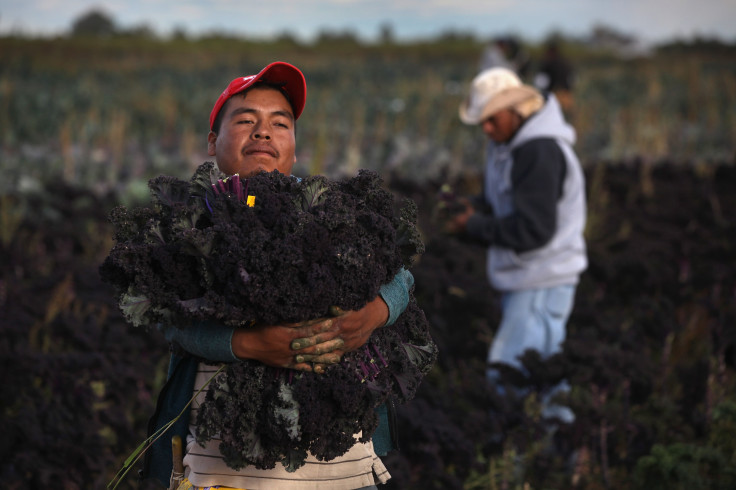
As the United States agriculture industry faces a decreasing labor force, made up mostly of undocumented immigrant workers, Donald Trump's promised mass deportation operation has many farmers and ranchers worried about their future.
While Trump has indicated his administration would initially focus on deporting immigrants with a criminal background, in a recent NBC interview the Republican leader revealed that the "others" would follow. His announcements, along with those made by incoming border czar Thomas Homan, have sent shockwaves through immigrant communities–and their employers.
The number of undocumented immigrant workers taking arduous and low-paying agricultural jobs has decreased over the last 10 years, per U.S. Department of Labor data, but the population still makes up nearly half the sector's workforce. According to the federal agency, immigrants account for two-thirds of the nation's crop farmworkers, with two out of five lacking legal authorization to work in the country.
During the last year, the U.S. Department of Agriculture reported a growing demand for agricultural labor, as evidenced by the rise in the number of employers seeking to hire foreign seasonal workers through the H-2A visa program. Notably, the number of H-2A worker positions skyrocketed from 48,000 in 2005 to over 378,000 in 2023.
The H-2A visa program enables U.S. agricultural employers to address labor shortages by hiring foreign workers for temporary or seasonal farm jobs when a sufficient domestic workforce is unavailable. However, agricultural businesses that operate year round such as dairy and meat packing plants, do not benefit much from this visa and could be particularly impacted by the mass deportation of their workers.

In Idaho, dairy farm owner Bruce Lampman, recently told the Wisconsin Examiner his business "wouldn't survive" without his undocumented workers. "My business and every agriculture business in the U.S. will be crippled if they want to get rid of everybody who does the work," he said. The National Milk Producers Federation also chimed in saying they strongly support "efforts to pass agriculture labor reform that provides permanent legal status to current workers and their families."
Babarba Guignard, Principal at Efficio, a Global Procurement and Supply Chain Consultancy, recently wrote an expert essay on the topic, in which she foreshadows "widespread disruption" following the possible mass deportation of undocumented workers.
"The reliance on undocumented workers has long been an open secret, with a delicate balance between labor needs and enforcement of immigration laws. A sudden crackdown could shift this balance, leaving farms understaffed and unprepared to manage critical tasks like planting, harvesting, and processing."
Guignard, put the United Kingdom's post-Brexit experience as an example. During this time, the UK's agricultural sector lost European Union migrant labor and reported significant losses of harvest and revenue.
"Crops such as daffodils, cucumbers, and strawberries were left unharvested, leading to substantial financial losses for farmers and a spike in food waste. According to a 2021 UK Parliament report, 24% of the nation's daffodil crop went unpicked, and individual farms reported losses exceeding £500,000 ($640,000) due to insufficient labor."
With Trump planning to start the "largest deportation in U.S. history" on his first day in office, Guignard warns about the timing, as "winter is a critical season for agricultural operations in warmer states like California, Florida, and Texas, where citrus fruits and winter vegetables are actively harvested. Labor shortages during this period could leave crops overripe and unharvested, leading to food waste and lost revenue," she explained.
The expert also pointed out that labor shortages could disrupt the agricultural supply chain, resulting in "higher food prices and increased reliance on imports." Effects that could potentially be intensified by one of Trump's key economic proposals—blanket tariffs on all foreign imports—a tactic, experts warn, could significantly impact Americans' wallets.
However, Trump has defended his proposed tariffs, arguing that they would quickly incentivize foreign companies to establish headquarters within the United States. This reasoning, however, overlooks the challenges faced by agricultural companies, whose products are intrinsically tied to the specific geographical conditions required for their cultivation.
© 2025 Latin Times. All rights reserved. Do not reproduce without permission.





